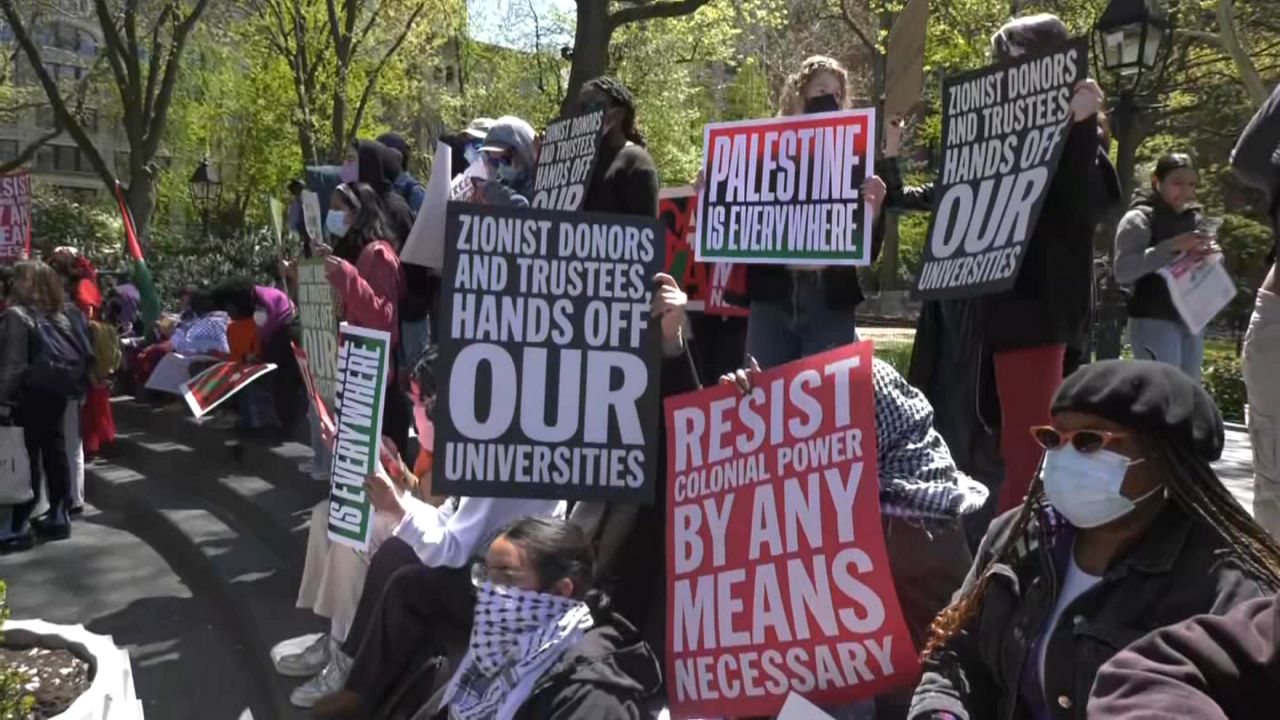Pro-Palestinian protests continued at several college campuses in the city on Tuesday, including Columbia University and New York University.
At Columbia, demonstrations entered their seventh day, with protesters gathered outside the university to support students taking part in an encampment on campus.
The protesters are demanding the university divest funds from Israeli companies, particularly those assisting with Israel's war efforts.
A heavy NYPD presence remained around the campus Tuesday. The university has also stepped up its own security at various locations and access points.
Students on Tuesday told NY1 they felt the campus was calmer than it had been in previous days.
“It’s super safe, quiet, [the] sun is shining. People are picnicking, studying. Yeah, very calm,” Eugene Petracca said.
Alana Flowers, meanwhile, said it was “more peaceful than it’s been this last week, today in particular.”
“I feel safe. I don’t think that things are as intense as some people might actually believe,” Flowers said.
Protests began last Wednesday as Columbia’s president testified on Capitol Hill about antisemitism on college campuses.
After occupying Columbia’s South Lawn for more than 30 hours, more than 100 student protesters were arrested after the university authorized the NYPD to break up the encampment.
The encampment reemerged over the weekend and has remained since. Security concerns have prompted university officials to institute a hybrid learning model wherever possible through the remainder of the term.
Columbia ID-only access will remain in place for the Morningside Heights campus “until circumstances allow for broader access,” university officials said.
This comes as claims of antisemitism at Columbia have escalated in recent days. University officials say there have been acts of vandalism, harassment and discrimination since protests began, adding that that their first priority is students’ safety, including those in the encampment.
“Columbia students have the right to protest, but they are not allowed to disrupt campus life or harass and intimidate fellow students and members of our community,” Ben Chang, vice president for communications at Columbia, said at a virtual news briefing Tuesday.
Chang said the university is acting on concerns expressed by some Jewish students, and is providing additional support and resources “to ensure that our community remains safe.”
Jessica Schwalb, a third-year human rights major at Columbia, said she felt she “shouldn’t have to wear the symbols of your group or agree 100% with your beliefs in order to not be targeted and harassed.”
“I think that's ridiculous, and it’s certainly a form of persecution, and the university should be stepping up and doing more to address that,” she said.
Schwalb said she and a few Jewish friends were targets of hate speech. She also showed NY1 a video of a group of Jewish students forced to leave the protest encampment over the weekend.
The university says it was in talks with student protest leaders until 2 a.m. Tuesday, with negotiations to continue, in part because the encampment is in violation of school rules.
“The current protest is in violation of university rules, and we are taking steps to resolve it,” Chang said.
At New York University, students flooded Washington Square Park on Tuesday in response to the more than 100 pro-Palestinian protesters arrested on campus by police Monday evening.
The students who were arrested were staying in tents at Gould Plaza near NYU’s business school, an encampment similar to the one at Columbia.
One student protester, who gave his first name, Dylan, said the response by the NYPD Monday night was unwarranted.
“They are trying to flip the script and say that this was a disruptive and antagonizing protest. We were chanting. We were singing. We were drumming,” he said.
In a statement Monday, NYU spokesperson John Beckman said the situation “dramatically changed” after barriers were breached by additional protesters in the afternoon “in violation of directions from Campus Safety Officers and in violation of multiple University rules.
He added that many protesters refused to leave, prompting them to involve police.
On Tuesday morning, NYU erected plywood walls around Gould Plaza. Security officers were also checking student IDs before allowing anyone on campus. Some students said the situation felt tense.
“I’m feeling, you know, a little uneasy about the protests, just wanting to keep myself safe, as well as other people,” a student named Jordanna said.
Other students said they would not let the new wall stop them from protesting, with one saying, “We’re going to continue to protest, and the school can’t silence us.”



